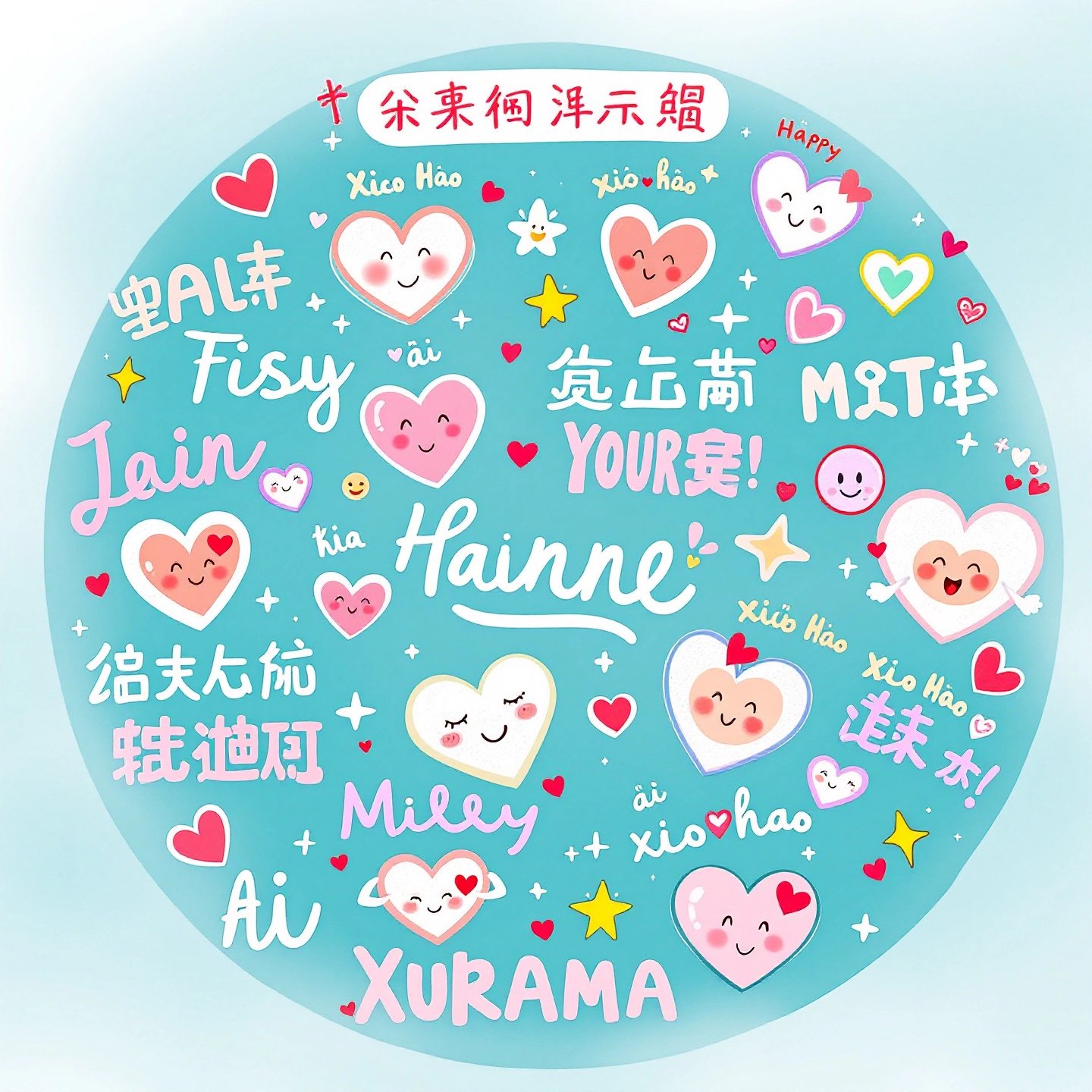Introduction to Cute Chinese Nicknames
Have you ever wondered how a simple name can convey warmth, affection, and a sense of belonging? In Chinese culture, cute Chinese nicknames do just that. These endearing terms are not merely labels; they are a reflection of deep emotional connections and cultural richness. In China, the use of nicknames is widespread, transcending the boundaries of age and relationship. Whether it's among friends, family, or lovers, these nicknames serve as a testament to the unique bonds shared between individuals.
Chinese nicknames, known as "昵称" (nì chēng), "绰号" (chuò hào), or "小名" (xiǎo míng), are often more casual and personal compared to formal names. They are used to express affection and intimacy, often highlighting someone's unique characteristics or shared memories. For example, a mother might affectionately call her child "小胖" (xiǎo pàng), meaning "little chubby," not as an insult but as a term of endearment, wishing health and cuteness upon them. This playful approach to nicknames is deeply embedded in Chinese social interactions (WuKong).
In romantic relationships, Chinese nicknames for lovers often carry special meanings beyond their literal translations. For instance, a boyfriend might be called "老公" (lǎo gōng), translating to "husband," even in non-marital relationships, reflecting a deep commitment and affection. Similarly, calling a girlfriend "小仙女" (xiǎo xiān nǚ), or "little fairy," adds a whimsical and loving touch to the relationship (Pandanese).
These cute Chinese nicknames are more than just words; they are cultural expressions that enrich personal relationships. By understanding and using these nicknames, one can foster a deeper connection and share in the warmth and affection that these terms naturally convey.
Understanding the Cultural Significance of Chinese Nicknames
In Chinese society, nicknames hold a profound cultural significance, reflecting not only personal traits but also intricate social dynamics and historical contexts. Imagine a world where a simple nickname can reveal the depth of a relationship or the nuances of social standing. Sounds intriguing? That's precisely the role Chinese nicknames play.
Historically, nicknames in China have been more than just casual monikers; they serve as a window into one's identity, social status, and familial ties. Traditionally, Chinese names are composed of a family name followed by a given name, but nicknames break from this formality, offering a more intimate glimpse into personal relationships. For instance, the repetition of a character in a name, like "明明" (míng míng), is often used among close friends or family, adding a layer of affection and familiarity (Reddit).
Nicknames also play a role in denoting social hierarchy and respect. In professional and formal settings, it's common to use "小" (xiǎo) or "老" (lǎo) before a surname to indicate youth or seniority, respectively. For example, "小张" (xiǎo zhāng) might be used for a younger colleague, while "老王" (lǎo wáng) could refer to an elder or respected peer (Cultural Atlas).
Moreover, the cultural tradition of nicknaming extends to reflecting one's personality or physical traits. A nickname like "胖子" (pàng zi), meaning "fatty," might sound harsh in English but is often used affectionately among friends, similar to calling someone "big guy" in English-speaking cultures. Such nicknames highlight the playful and endearing nature of Chinese social interactions.
As society evolves, so do the traditions of naming and nicknaming. The influence of digital communication has introduced new trends, with netizens often adopting creative and humorous nicknames that resonate within online communities. These digital-era nicknames continue to reflect personal traits and social connections, bridging traditional practices with modern expressions.
Understanding these cultural nuances enriches our appreciation of Chinese nicknames, revealing how they serve as a tapestry of personal and social identity, woven with threads of history, respect, and affection. As we delve deeper into the world of cute Chinese nicknames, you'll notice how these terms of endearment continue to foster connections in both personal and digital landscapes.

Common Themes in Cute Chinese Nicknames
When exploring the world of cute Chinese nicknames, you'll notice some recurring themes that are deeply intertwined with cultural elements and personal expression. These themes often draw from nature, animals, and endearing terms, each carrying its own layer of affection and familiarity. But what makes these themes so special, and how do they enhance the charm of a nickname?
Animal Inspirations
Animals play a significant role in Chinese nicknames, often symbolizing traits or characteristics admired in a person. For example, calling someone "熊猫" (xióng māo), meaning "panda," might reflect their gentle nature or love for leisure. Similarly, "小虎" (xiǎo hǔ), translating to "little tiger," could be used for someone who is perceived as fierce yet adorable. These cute Chinese animal nicknames are not only playful but also serve as a form of compliment, celebrating the unique qualities of the individual (Language Lab).
Nature's Influence
Nature is another rich source of inspiration for Chinese nicknames. Names like "清风" (qīng fēng), meaning "gentle breeze," evoke a sense of calm and tranquility, while "海洋" (hǎi yáng), translating to "ocean," might suggest depth and vastness. Such nature-inspired nicknames often convey a sense of peace and beauty, reflecting the cultural appreciation for the natural world (Quora).
Endearing Terms
Using endearing terms in nicknames is a common practice that underscores the warmth and affection inherent in Chinese relationships. Terms like "宝贝" (bǎo bèi), meaning "treasure," or "心肝" (xīn gān), translating to "heart and liver," are used to express deep love and care, often reserved for close family members or significant others. These terms highlight the emotional bonds and the cherished status of the person being referred to.
In essence, the themes found in cute Chinese nicknames are a testament to the creativity and emotional depth of Chinese culture. They not only reflect personal traits but also strengthen the bonds between individuals, making them an integral part of social interaction. As we continue to uncover more about these charming nicknames, you'll see how they enrich relationships by adding layers of meaning and affection.
Popular Cute Chinese Nicknames for Loved Ones
In Chinese culture, nicknames are a cherished way to express affection and familiarity among loved ones. Whether for significant others, family members, or close friends, these nicknames often capture the essence of the relationship in a single word or phrase. Let's explore some popular Chinese nicknames that are frequently used to convey warmth and closeness.
Nicknames for Significant Others
- 亲爱的 (Qīn'ài de) - Often used like "darling" or "dearest," this term is a staple among couples, symbolizing deep affection and commitment.
- 宝贝 (Bǎo bèi) - Meaning "treasure" or "precious," this nickname emphasizes how much a partner is valued, akin to calling someone "baby" or "sweetie."
- 老公 (Lǎo gōng) & 老婆 (Lǎo pó) - These terms translate to "husband" and "wife," respectively, and are used by couples to signify a deep bond, sometimes even before marriage.
Nicknames for Family Members
- 小宝 (Xiǎo bǎo) - Meaning "little treasure," this nickname is often used for children, expressing the joy and value they bring to the family.
- 大哥 (Dà gē) & 小妹 (Xiǎo mèi) - Translating to "big brother" and "little sister," these terms are used among siblings to denote order and affection within the family hierarchy.
- 阿姨 (Ā yí) - While it means "aunt," this nickname is affectionately used for older women who are close family friends, reflecting respect and endearment.
Nicknames for Close Friends
- 哥们 (Gē men) - Used for male friends, this term is similar to "bro," indicating a strong bond and camaraderie.
- 闺蜜 (Guī mì) - This term is used for female best friends, akin to "BFF," highlighting a deep, sisterly connection.
- 死党 (Sǐ dǎng) - Literally translating to "die-hard party," this nickname is for friends who are inseparable, emphasizing loyalty and shared experiences.
These popular Chinese nicknames are more than just affectionate terms; they are cultural expressions of love and connection. By using these nicknames, individuals reinforce their bonds and celebrate the unique dynamics of their relationships. As we delve further into the world of cute Chinese nicknames, you'll see how these terms enrich personal interactions, making them an integral part of social bonding.

How to Create Your Own Cute Chinese Nickname
Imagine crafting a nickname that not only reflects your personality but also resonates with the rich tapestry of Chinese culture. Sounds intriguing? Creating a personalized Chinese nickname is an art that combines cultural understanding with personal expression. Let’s explore how you can create a cute Chinese nickname that is both meaningful and uniquely yours.
First, consider the traits or interests you wish to highlight. Whether it’s a passion for nature, a particular animal you admire, or a personal characteristic, these elements can serve as the foundation of your nickname. For instance, if you love the ocean, a nickname like "海洋" (hǎi yáng), meaning "ocean," might be fitting.
Next, delve into the cultural nuances. Chinese nicknames often carry poetic and symbolic meanings, so it’s crucial to choose characters that convey positive traits. Avoid characters with negative connotations to ensure your nickname is pleasant and well-received.
To assist you in crafting your nickname, consider this table that aligns traits or interests with Chinese characters and their pronunciations:
| Trait/Interest | Chinese Character | Pronunciation |
|---|---|---|
| Bravery | 勇 | Yǒng |
| Beauty | 美 | Měi |
| Wisdom | 智 | Zhì |
| Love for Nature | 清风 | Qīng fēng |
| Playfulness | 淘气 | Táo qì |
Once you have selected the traits and characters, experiment with different combinations until you find a nickname that feels right. Remember, the best nicknames are those that resonate with your identity and bring joy to those who use them.
Creating a personalized Chinese nickname is a journey into the heart of cultural expression. By thoughtfully selecting characters that reflect your interests and personality, you can craft a nickname that is both endearing and meaningful. As you explore this creative process, you’ll find that a well-chosen nickname not only enhances your cultural connection but also enriches your personal relationships.
Examples of Cute Chinese Nicknames
When it comes to cute Chinese nicknames, the options are as diverse as they are charming. These nicknames often reflect cultural values, personal traits, and affectionate bonds. Below are some delightful examples that illustrate different styles and themes, each with its unique meaning and usage context.
For Significant Others
- 亲爱的 (Qīn'ài de) - This versatile term means "dear" or "darling," commonly used among couples to express deep affection.
- 宝贝 (Bǎo bèi) - Literally translating to "treasure" or "precious," it conveys how cherished the person is, similar to "sweetheart" or "baby."
- 男神 (Nán shén) - Meaning "male god," this playful nickname is used to compliment a boyfriend, highlighting his admirable traits.
For Family Members
- 小宝 (Xiǎo bǎo) - Meaning "little treasure," this nickname is often used for children, emphasizing their importance and the joy they bring.
- 大姐 (Dà jiě) - Translating to "big sister," this term is used to show respect and affection for an elder sister.
- 老爸 (Lǎo bà) - A casual and affectionate way to refer to one's father, similar to "dad" or "pops."
For Close Friends
- 哥们 (Gē men) - Used among male friends, akin to "buddy" or "bro," symbolizing camaraderie and trust.
- 闺蜜 (Guī mì) - This term is for female best friends, similar to "BFF," highlighting a deep and supportive friendship.
- 死党 (Sǐ dǎng) - Meaning "die-hard buddy," this nickname emphasizes loyalty and shared experiences among close friends.
For Children
- 小猪 (Xiǎo zhū) - Translating to "little pig," a cute and endearing nickname for a chubby or adorable child.
- 笑笑 (Xiào xiào) - Meaning "smile smile," this nickname is for a cheerful child, emphasizing their joyful nature.
- 葡萄 (Pútáo) - Literally "grape," used to describe a sweet and round child, akin to calling them "cutie."
These examples of Chinese nicknames showcase the creativity and emotional depth that characterize these terms. Whether for a partner, family member, or friend, these nicknames add a layer of warmth and personal connection to relationships. As you explore these cute Chinese nickname examples, you'll find that they not only reflect cultural values but also enrich the bonds between individuals, making them an integral part of social interaction.

The Role of Nicknames in Chinese Social Media and Online Communities
In the digital age, the use of nicknames in Chinese social media and online communities has become a fascinating aspect of digital culture. With platforms like WeChat, Weibo, and Alipay, nicknames have evolved beyond mere identifiers to become expressions of identity, humor, and creativity.
Chinese nicknames on social media often reflect personal interests, humor, or cultural references. For instance, a user might choose a nickname like "小龙女" (xiǎo lóng nǚ), meaning "Little Dragon Girl," inspired by popular literature or media. Such nicknames serve as conversation starters and reflect shared cultural experiences among users (Springer).
Online Chinese nickname trends also reveal the influence of digital culture. Emojis and special characters are frequently incorporated into nicknames, adding a layer of personalization and playfulness. This trend is particularly popular among younger users, who often use nicknames to express individuality and creativity in online spaces.
Moreover, the anonymity afforded by social media platforms allows users to experiment with different identities through their nicknames. This flexibility enables individuals to craft personas that might be more adventurous or humorous than their real-life counterparts. Such practices highlight the dynamic and ever-evolving nature of online communities, where nicknames play a pivotal role in shaping interactions and relationships.
As digital culture continues to influence nickname usage, you'll notice how these creative expressions enhance online interactions, making them more engaging and personalized. Whether it's through a clever pun, a cultural reference, or a playful emoji, Chinese nicknames on social media platforms are a testament to the richness of digital communication and the vibrant tapestry of modern Chinese culture.

Tips for Choosing the Perfect Cute Chinese Nickname
Choosing the perfect cute Chinese nickname can be a delightful journey into cultural appreciation and personal expression. But how do you ensure that the nickname resonates both personally and culturally? Here are some practical tips to guide you through the process.
Consider Pronunciation
Imagine introducing yourself with a nickname that's difficult to pronounce. Sounds tricky, right? When choosing a Chinese nickname, consider how easily it can be pronounced by native speakers. Opt for names that are phonetically straightforward, ensuring that they roll off the tongue smoothly. This consideration not only helps in social interactions but also shows respect for the language.
Focus on Meaning
Chinese nicknames often carry rich meanings that reflect personal traits or aspirations. When selecting a nickname, delve into the meanings of the characters to ensure they convey positive attributes. For instance, a name like "明" (míng), meaning "bright" or "intelligent," can be a wonderful choice for someone who values wisdom and clarity. Avoid names with negative connotations to maintain a positive impression.
Assess Social Appropriateness
In Chinese culture, social appropriateness is key. A nickname that might be endearing in one context could be inappropriate in another. For example, using a nickname like "胖子" (pàng zi), meaning "fatty," might be affectionate among close friends but could be considered offensive in formal settings. Always consider the social context in which the nickname will be used, ensuring it's suitable and respectful.
Incorporate Personal Interests
Personalize your nickname by incorporating your interests or passions. If you love music, a nickname like "乐" (yuè), meaning "music," could be fitting. This personal touch not only makes the nickname unique but also serves as a conversation starter, allowing others to learn more about you.
By thoughtfully considering pronunciation, meaning, social appropriateness, and personal interests, you can choose a cute Chinese nickname that is both culturally resonant and personally meaningful. As you explore these options, you'll find that the right nickname can enhance your cultural connection and enrich your interactions with others.
Conclusion
As we journey through the world of cute Chinese nicknames, it becomes evident that these endearing terms are more than just simple labels—they are a vibrant tapestry of cultural expression and personal connection. From expressing affection among loved ones to reflecting unique personal traits, Chinese nicknames hold a special place in fostering meaningful relationships.
Throughout this exploration, we have delved into the cultural significance and common themes that define Chinese nicknames. Whether drawing inspiration from animals, nature, or affectionate terms, these nicknames encapsulate the warmth and creativity inherent in Chinese culture. The ability to craft a personalized nickname that resonates with one's identity is a testament to the cultural richness and emotional depth these names offer.
In today's digital age, the role of nicknames extends to online communities, where they enhance interactions and express individuality. As digital culture evolves, nicknames continue to bridge traditional practices with modern expressions, enriching social connections in both personal and virtual spaces.
For those seeking to create unique Chinese nicknames, the journey is made easier with tools like CNG's Chinese Name Generator. This AI-driven tool offers a seamless way to generate culturally authentic and meaningful names, allowing users to explore a broad spectrum of options that reflect their personality and cultural appreciation. By integrating genuine cultural elements, the tool ensures that each nickname is not only linguistically accurate but also holds cultural depth, making it an invaluable resource for anyone looking to create unique Chinese nicknames.
As you embrace the charm of cute Chinese nicknames, remember that these names are more than just terms of endearment—they are bridges that connect individuals across cultures and generations. Whether you are crafting a nickname for a loved one or exploring new identities online, the right nickname can enhance your cultural connection and enrich your personal interactions. Explore the possibilities with CNG's Chinese Name Generator and discover a world of meaningful and adorable name ideas that resonate with your unique identity.
FAQs about Cute Chinese Nicknames
1. What is a cute Chinese nickname?
A cute Chinese nickname is an affectionate term used to express fondness and endearment. Examples include 小可爱 (Xiǎo kě'ài) meaning "Little Cutie" and 宝贝儿 (Bǎobèi er) meaning "Baby" or "Darling." These nicknames reflect deep emotional connections and cultural richness.
2. How do you call a girl cute in Chinese?
To call a girl cute in Chinese, you can use the term 可爱 (kě ài), which translates to "lovable" or "cute." It is a common and affectionate way to compliment someone's appearance or demeanor.
3. How do you make a Chinese nickname?
Creating a Chinese nickname involves considering personal traits, cultural nuances, and the meanings of Chinese characters. For young individuals, "小"+Last Name is common, while for elders, "老"+Last Name is used. Personal interests can also inspire unique and meaningful nicknames.
4. What are popular Chinese nicknames for loved ones?
Popular Chinese nicknames for loved ones include 亲爱的 (Qīn'ài de) for "darling," 宝贝 (Bǎo bèi) for "treasure," and 老公 (Lǎo gōng) for "husband." These terms express affection and are commonly used among couples and family members.
5. How do nicknames work in Chinese social media?
In Chinese social media, nicknames often reflect personal interests, humor, or cultural references. Users creatively incorporate emojis and special characters to express individuality, making nicknames a vital part of digital interactions and identity.



